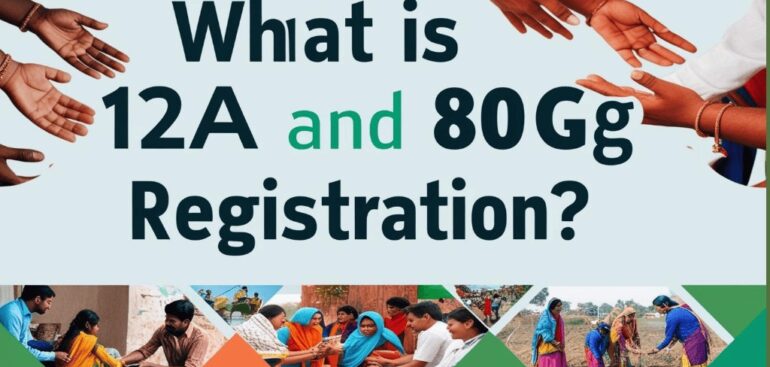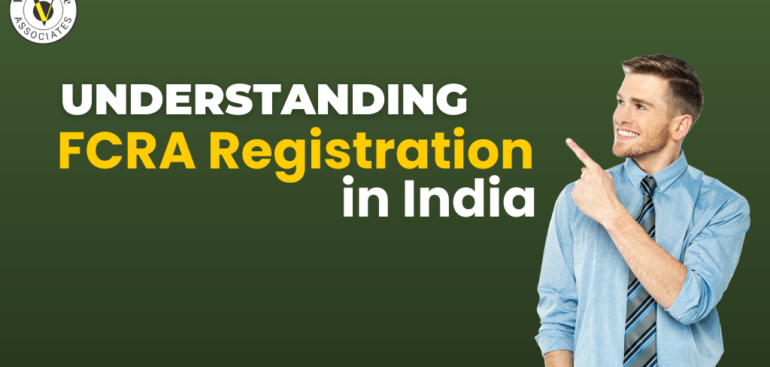Non-government organizations have made a considerable contribution towards India’s social and economic development.
The top 200 non-profits in India are in the annual budget range of ₹ 10 crore to 800 crore.
These NGOs depend upon grants, donations, and other kinds of contributions for their subsistence and achievement of objectives. To encourage donations to these organizations, the Government grants 12A and 80G registration. Let us understand these registrations in a better way.
12A Registration
Under Section 12A of the Income Tax Act of 1961, a tax rebate is granted to NGOs. It exempts them from paying tax on income received from grants, donations, and other contributions to the organization. This registration is compulsory for NGOs that want to avail exemptions under Section 12A.
80G Registration
Registration under 80G allows donors to avail of tax exemption on donations made to NGOs. This facilitates more donations towards the welfare activities of these organizations. This means that 80G registration is not mandatory and can only be availed if a person donates to an NGO that has 12A registration.
Understanding Sections 12A and 80G of the Income Tax Act
Section 12A
Section 12A lays down conditions under which NGOs can apply for Sections 11 and 12 of the Income Tax Act. Section 11 excludes certain kinds of income from the total taxable income, while Section 12 includes any voluntary contributions received as grants and donations for charitable and religious purposes.
Section 80G
Section 80G clause (1) specifies the deduction of certain donations from taxable income. Clause (2) specifies the type of contributions that fall within its ambit. NGOs should have 12A registration, be registered in India, and use these funds only for charitable or religious purposes.
Eligibility for 12A and 80G Registration
For 12A Registration
- Nature of the Organization:The organization should be a trust or institution established exclusively for charitable or religious purposes.
- Charitable Activities: Activities should be such that they would accomplish the charitable objectives of the organization and not be based on making profits.
- Registration: The organization should be registered as a trust, society, or Section 8 company.
- Utilization of Income: Income should be used only for charitable or religious purposes and not for individual benefit.
- Maintenance of Books and Accounts: Proper accounts of income, expenditure, and activities should be maintained.
- Regular filing of Returns: Timely filing of returns of annual income tax must be made to maintain the status of exemption from tax.
- No Political Activities:The organization cannot take part in political activity or favour political parties.
For 80 G Registration
- Nature of the Organization: This applies to non-profit organizations such as trusts, societies, and Section 8 companies established for charitable or religious purposes.
- 12A Registration: The NGO has to have 12A registration.
- No Non-Charitable Use of Income:Funds must be used only for charitable activities.
- Non-Exclusivity of Beneficiaries:The organization should benefit a broad spectrum of society and not just a specific religious community or caste.
- Regular Accounting: Proper and regular accounts of financial transactions shall be maintained.
Documents Required for 12A and 80G Registrations
The following documents have to be submitted by the NGOs to complete the registration procedure:
- Self-certified copy of the trust deed or any other document relating to the creation of the organization.
- Self-certified registration certificate of the institution and its Memorandum of Association or Byelaws.
- FCRA Registration Certificate, if available.
- Annual accounts of the organization for the last three financial years.
- Audit report by a Chartered Accountant, if required
- NGO Darpan ID.
How to Get 12A and 80G Registration?
Step-by-Step Process
- Formation and Registration of NGO: Structuring of the legal framework for the NGOs, either trust, society or Section 8 company and getting the same registered with the concerned authority.
- Collection of documents:All the documents required for registration should be collected.
- Application Form Preparation: Fill out Form 10A with correct information related to the various objectives and activities of the organization.
- Application Form Submission:File Form 10A, together with other required documents, before the Income Tax Commissioner or through the Income Tax Website.
- On-Site Inspection:The tax department scrutinizes the application. It might inspect the working pattern and books of records of the organization.
- Registration Decision: Based on the scrutiny, the tax department registers or rejects the application for registration.
- Registration Intimation: Get the official registration certificate for approval.
Validity of 12A and 80G Certificates
All the initial registrations are provisional and have a validity period of three years. NGOs should apply for renewal six months before expiry or within six months of commencing activities. Renewed registrations are valid for five years.
Benefits of 12A and 80G Registrations
- Tax Exemptions for Donors:Donations made to NGOs with 80G registration are tax-deductible.
- Advanced Credibility and Trust:Official registrations bring about increased credibility for any organization.
- Better Fund-Raising Potential: Tax exemption encourages more donations.
- Government Grants:It is a prerequisite for many government grants.
- Long-term Sustainability: It helps the NGOs to find sources of funding that are sustainable in the long term.
- Efficient Use of Resources:The funds can be spent only for charity.
Expert Assistance for 12A and 80G Registrations
Vedkee Associates shall extend complete support for 12A and 80G registrations. They have online consultations; their services are quite transparent and affordable. Contact us to continue to get yourself registered for 12A and 80G.
Call us at +91 981-023-8067
Frequently Asked Questions
1. What is Section 12A registration?
Section 12A registration allows tax exemption on income made by non-profit institutions from grants and donations which is used solely for charitable or religious purposes.
2. Who can apply for Section 12A registration?
Registered non-profit entities like trusts, societies, and Section 8 companies set up for charitable purposes in India can apply for Section 12A registration.
3. Can an NGO avail of both 12A and 80G registrations simultaneously?
No, 80G registration can only be obtained after obtaining 12A registration.
4. What are the chief advantages of 80G registration for donors?
It is a tax-deductible amount that the donors can claim, the avenue becomes quite appealing to support charitable causes.
5. How does registration under 80G increase an NGO’s fundraising potential?
More generous donations due to tax benefits will come to the organization.
Also read:


